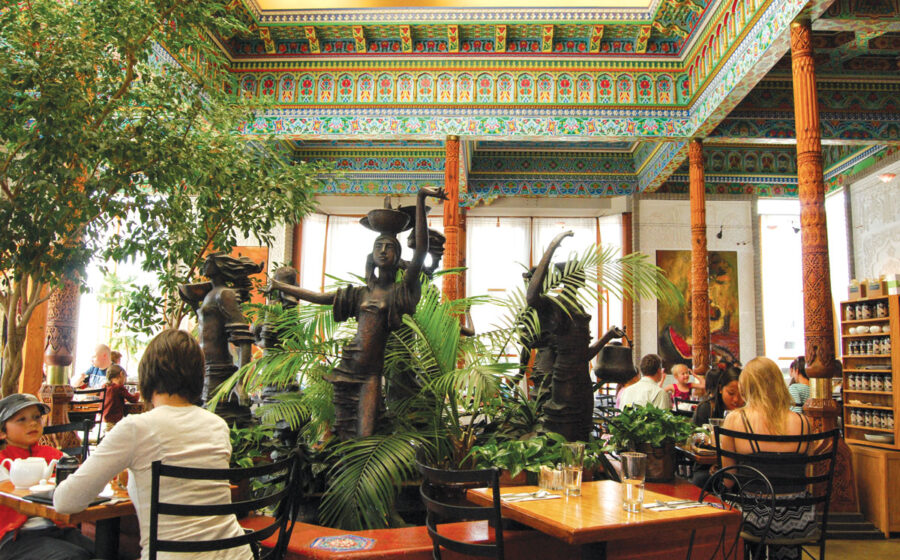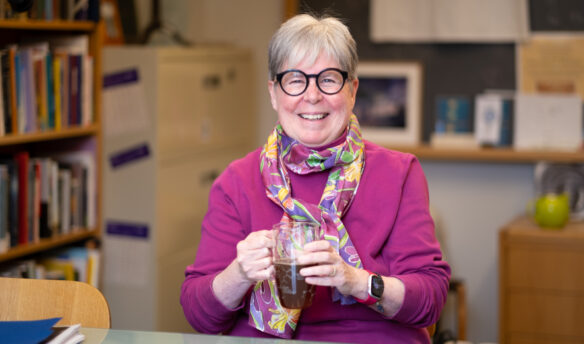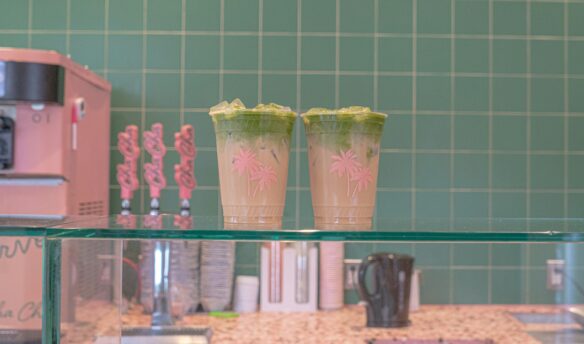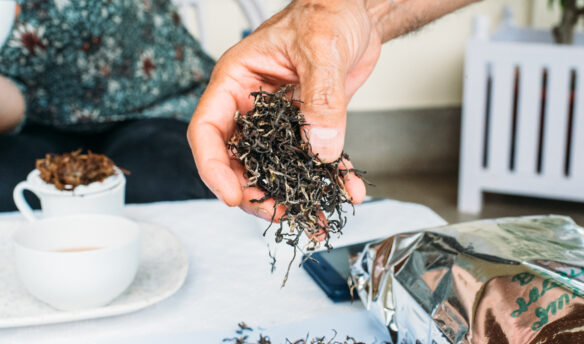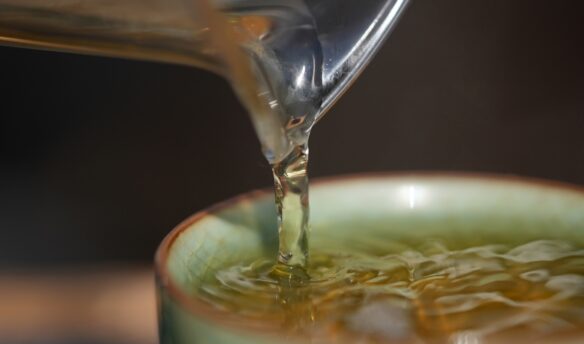[T]here is no place in the entire Western Hemisphere like the Boulder Dushanbe Teahouse in Boulder, Colorado. While Japanese tea culture demonstrates its formality through Dushanbe’s tea service, Central Asian tea culture demonstrates itself in the building’s design. The building is set back from the road and visitors first walk through a fragrant rose garden before really noticing the structure. Sure, the outside is lovely, with shades of blue and purple trim and floor-to-ceiling painted tiles, but the real magic is inside.
As soon as you walk in the front door you are greeted by the Fountain of the Seven Beauties, from a twelfth-century Turkish folk story shared along the Silk Road. Then you might notice the cedar pillars. Not found locally in Colorado, the wood for these had to be shipped in from Siberia. On the walls around the teahouse visitors will notice oil paintings and traditional plaster tiles. But the most popular and most magnificent part of the entire teahouse is the ceiling. Bright colors, traditional Tajik-Persian symbols such as flowers and geometric shapes, and the mihrab (Islamic prayer arch) that adorn the ceiling tiles oftentimes make it difficult to focus on anything else.
In Central Asia, teahouses, or choihonas, are meeting spots. Places to slow down and talk about life over a cup of tea. And that is exactly what the teahouse is bringing to this busy college town in Colorado.
There is no Wi-Fi at the Boulder Dushanbe Teahouse, which means there are no college students huddled over computers, and people are actually connecting with each other. I met Rebecca, a regular at the teahouse, who comes to this “inspiring, gorgeous environment” to work on her novel. She told me about a man who works at the University of Colorado in Boulder and brings clients to the teahouse, and that college students usually bring their parents for a unique experience. We connected over our mutual love for exploring Colorado trails. All around the teahouse, people were observing each other, talking to each other, and enjoying a cup of loose-leaf tea.
But the story of the Boulder Dushanbe Teahouse wasn’t always a happy one. In fact, many people didn’t want the teahouse at all. It was late in 1982, in the middle of the Cold War, when a couple of activists met and wanted to establish a Sister City relationship with a city in the Soviet Union to foster understanding and possibly even help ease the tensions between the United States and the Soviet Union.
Dushanbe, the capital of the Tajik Soviet Socialist Republic, was chosen at random and pursued unsuccessfully until the mayor of Dushanbe realized that there was a traditional Tajik balalaika band in Boulder.
In May of 1987, Mayor Maksud Ikramov visited Boulder and announced that Dushanbe would gift Boulder a traditional Tajik choihona. As the Tajik people began handpainting the tiles, handcarving the cedar pillars, and handcrafting the plaster panels, the Teahouse Trust began campaigning and working to get funding from the Boulder City Council. In 1990, the teahouse arrived in Boulder in 200 shipping crates, only to be stored for the next seven years.
The arguments against the teahouse ranged from everything from the need to spend tax money on something more useful to being worried that the Soviets were bugging the teahouse to spy on the nearby Rocky Flats Plant, a former US nuclear weapons production facility. Meanwhile, in 1991, in the wake of the Soviet Union’s collapse, Tajikistan had become an independent state. After going back and forth, the teahouse was finally approved and construction began at its current site in 1997.

In the spirit of international understanding the teahouse features international cuisine, including Moroccan, Indian, Persian, Malaysian, and traditional Tajik dishes that change seasonally. But the real focus is the tea. With more than 100 teas at any given time, there is something for everyone. The teahouse offers teas from China, India, Sri Lanka, Japan, and Taiwan, all of which are loose-leaf. Sara Martinelli, half of the wife-and-husband team that has run the teahouse since it opened in 1998, is a certified medical herbalist and has formulated some of the tea blends.
Manager Matt Keifer feels that the teahouse encourages a healthier lifestyle. Not only because of the benefits of drinking tea, but because Sara and Lenny Martinelli own farm-to-table Three Leaf Farm, where the tea scraps are used as compost for the soil, and harvests end up in restaurants around Boulder, including the menu at Dushanbe.
Though most people’s eyes are immediately drawn to the ceiling, Lenny describes the teahouse as “a complete piece of art.” He believes that it’s “an excellent example of what people can do in collaboration to bring cultures together. It’s an awesome example of traditional Persian art and architecture in a place that can be enjoyed on a participation level versus behind glass in a museum.”
When asked what has been his most valuable experience since being involved in the teahouse, Lenny says, “We have learned how to understand world cultures through food and tea.”
—Abbie Mood is a writer based in Colorado.



